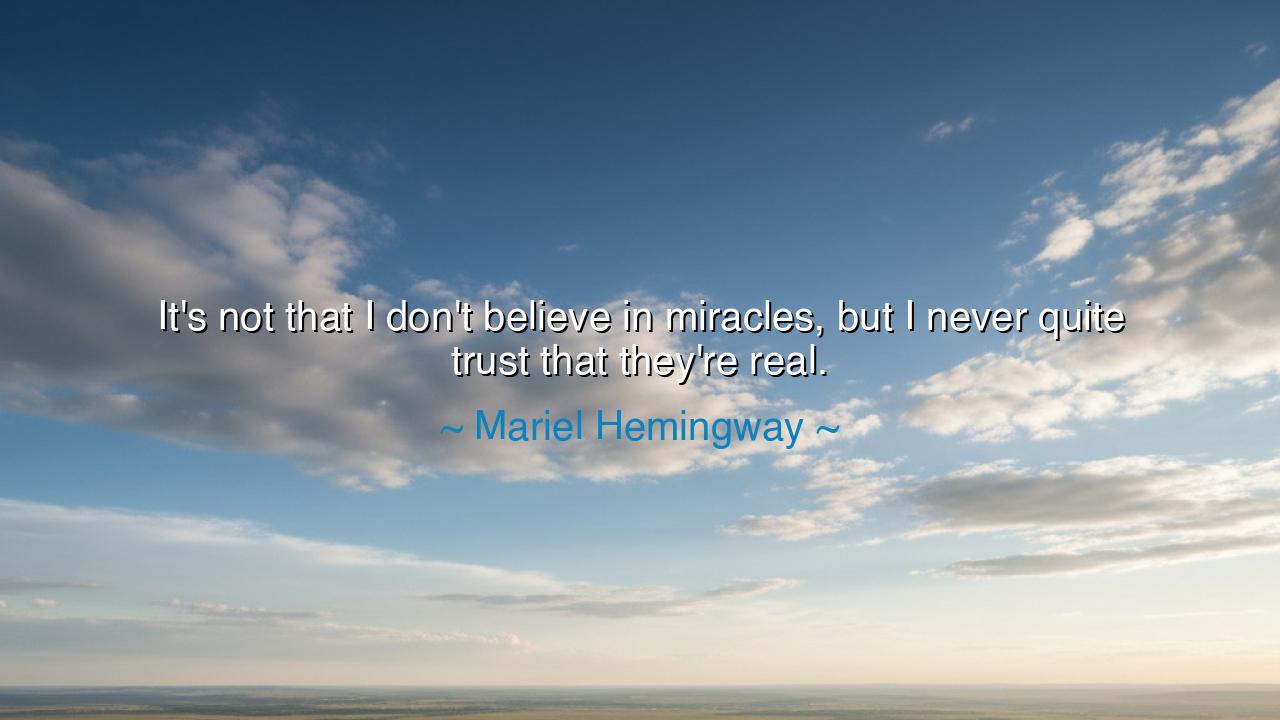
It's not that I don't believe in miracles, but I never quite






The words of Mariel Hemingway move with the weight of longing and doubt: “It’s not that I don’t believe in miracles, but I never quite trust that they’re real.” In this confession, we hear the cry of one who yearns for wonder but has been tempered by sorrow, disappointment, or the harshness of reality. It is the voice of the human soul caught between hope and skepticism, between the dream of the divine and the memory of broken promises. Hers is not the voice of cynicism, but of fragile faith—faith wounded, yet not extinguished.
The ancients themselves wrestled with such tension. The philosophers of Greece debated the nature of the extraordinary: were miracles signs from the gods, or illusions crafted by men? Plato spoke of the Forms, higher realities glimpsed dimly in the cave of our world, while Aristotle sought causes and order even in the wonders of nature. The Hebrews sang of seas parting and manna from heaven, but also wrote psalms of despair when miracles did not come. Hemingway’s words echo these struggles: the eternal tension between the heart’s need for wonder and the mind’s demand for certainty.
To believe in miracles is to leave room for mystery, for the possibility that life holds more than the eye can see. Yet to trust in them is to surrender entirely to that belief, and this Hemingway cannot do. Perhaps, like many before her, she has seen too much suffering that went unanswered, too many prayers that seemed unheard. Her words remind us that the human soul is not made only of faith, but also of scars. Even in the face of wonder, we hesitate, fearing to be deceived.
History gives us examples of this hesitation. Consider Thomas the Apostle, who, after hearing of Christ’s resurrection, declared he would not believe unless he placed his hand upon the wounds. His doubt did not erase his faith, but revealed its fragility. Or think of those who lived through plagues, wars, and disasters—people who prayed for miracles yet buried their loved ones. They carried with them the same tension Hemingway describes: not the denial of miracles, but the inability to fully trust them in a world that so often breaks the heart.
Yet there is wisdom in her words. For to distrust miracles is not to reject wonder—it is to remind us that we must not wait passively for deliverance. If a miracle comes, we rejoice. But if it does not, we must still act, still endure, still shape life with our own hands. To rely only on miracles is to abandon responsibility. To acknowledge their possibility without trusting in their certainty is to walk the middle path: hopeful, but not idle; open, but not naïve.
The lesson is this: let your heart remain open to wonder, but do not let it rest upon it. Miracles may come, and when they do, let them strengthen your spirit. But live as though they will not, so that your strength, your courage, your compassion, will be enough to carry you through. In this way, you are not crushed if the miracle delays, and you are doubly blessed if it arrives.
Practical actions follow: cultivate gratitude for the small wonders that surround you daily—the breath in your lungs, the rising of the sun, the kindness of a stranger. Do not demand miracles, but build resilience through discipline and love, so that you may endure even when the extraordinary seems absent. When wonder does visit—whether through an answered prayer, an unexpected blessing, or a moment of beauty—receive it with joy, but do not chain your hope to it alone. In this balance, you will live with both faith and wisdom, and find strength whether miracles come or not.






NDLuong Hoang Ngoc Duc
Hemingway’s words resonate with the conflict many of us feel between hope and doubt. We may long for miracles, but the uncertainty that comes with them often leaves us hesitant to believe. What does it say about us when we question the miraculous? Is it a form of self-protection, or is it an essential part of maintaining a healthy perspective on life? Can we truly accept something amazing without first questioning its authenticity?
브브우남
This quote makes me think about how people often grapple with belief and doubt. On one hand, it’s comforting to think that miracles are possible, but on the other, skepticism keeps us grounded. Is it possible to truly believe in something we can’t fully explain? Do miracles lose their meaning if we question them too much? Or is that questioning part of what makes them so valuable, as it keeps us from taking things for granted?
HTHue Tran
I find Hemingway's quote so relatable. It captures the feeling of wanting to believe in something extraordinary, yet remaining cautious about its validity. Is it the fear of disappointment that keeps us from fully trusting in miracles, or is it our need for logical, tangible explanations? How do we navigate that space between hope and doubt without closing ourselves off to the possibility of something miraculous happening?
MTVu Minh Trang
Mariel Hemingway’s quote speaks to the tension between hope and skepticism. It’s easy to want to believe in miracles, but the doubt that they are real can be hard to shake. Does this mean that miracles, if they do happen, are so rare that we have trouble accepting them as truth? Can we still hope for the impossible while holding on to that uncertainty? How do we reconcile our desire for miracles with our natural tendency to question their authenticity?